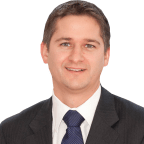Speakers
-
Sophie Dapin Solutions Manager
Sophie is a member of the Fiduciary Management team at Schroders, responsible for provision of strategic and liability-led input to clients. She joined Schroders in 2016 and is based in London. Sophie is a Member Nominated Trustee for the Schroders Retirement Benefits Scheme.
Prior to joining Schroders, she worked in the both the actuarial and investment practices of Lane Clark & Peacock LLP.
She is a Fellow of the Institute of Actuaries (FIA) and Chartered Enterprise Risk Actuary (CERA) and has a First Class Master’s Degree in Chemistry from University of Oxford.
-
Ross Pritchard Head of Fiduciary, Liability and Duration Solutions Management
Ross leads a team responsible for working with clients and their advisers to understand their objectives and structure integrated solutions across liability hedging, fiduciary management and related solutions. He and the team are responsible for the implementation and ongoing delivery of LDI and liability cognisant credit portfolios and related overlays. Ross joined Schroders in 2007 and is based in London. Before joining Schroders, Ross was Head of Investment Strategy and a Senior Investment Consultant at HSBC Actuaries and Consultants, responsible for advising a portfolio of pension schemes on investment strategy.
Ross has a BSc in Economics from the University of Warwick, is a CFA Charterholder and a Fellow of the Institute of Actuaries.
-
David Thomas Fiduciary Management Business Development Director
David is a member of the Institutional client team focused on developing the Schroders Fiduciary Management proposition and business. He is responsible for developing relationships with clients and pensions professionals to understand their individual requirements and discuss how Schroders FM Solutions could help them achieve their objectives.
David joined Schroders in 2021 and is based in London. Before joining Schroders, David was at Goldman Sachs Asset Management for over 14 years where he worked in a number of roles supporting the business most recently as Head of FM Sales for the UK Institutional Client Business.
He has a BSc in Economics from the University of Birmingham and is an IMC holder.
-
Stephen Bowles Senior Director, Fiduciary and Consultant Relations
Stephen is Senior Director, Fiduciary and Consultant Relations at Schroders. He has particular focus on outsourcing and senior field consultant relationships. Until 2017 he ran the UK Defined Contribution business He joined Schroders in 2008 and is based in London.
Stephen was an Account Development Manager at Prudential from 2006 to 2008 and a Senior Investment Consultant at Aon from 2001 to 2006.
His qualifications include; ACII; IMC; BSc in Economics and Politics from University of Bath.
-
Hannah Simons Head of Sustainable Strategy
Hannah Simons is responsible for our Sustainability Strategy. In this role she works in partnership with our client facing and investment teams to deliver a cohesive set of investment options to our clients. She is also responsible for the Sustainability capability
Prior to this she was Head of Fiduciary Management, she was promoted to this role in 2017, having joined Schroders in 2015. This involved providing strategic and liability-led input to clients, with a focus on assisting them to structure solutions that help meet their funding targets.
Hannah was a Fiduciary Partner at Russell Investments from 2013 to 2015, which involved providing total plan solutions to small and medium sized clients. She was an LDI product specialist at PIMCO from 2011 to 2013, a Solutions Specialist at BlackRock from 2004 to 2011 and an Investment Consultant at Watson Wyatt from 1999 to 2004.
-
Rosalind Scott-Douglas Fiduciary Manager
Rosalind is a Solutions Manager at Schroders, responsible for the design and oversight of clients' investment strategies. She joined Schroders in 2013 and is based in London.
Previously Rosalind was a Investment Consultant at Towers Watson from 2008 to 2013, where she helped institutional clients to design and implement their investment strategies.
Her qualifications include; Chartered Financial Analyst (CFA) Charterholder; MMath in Mathematics University of St Andrews.






